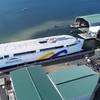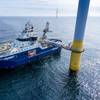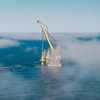NSRP Shipbuilding Workshop
The National Shipbuilding Research Program (NSRP) held its second “Shipbuilding Opportunities in Marine Highways” workshop at Advanced Technology Institute on October 21-23, 2008.
Funded by the Navy and industry through NSRP, the workshop was planned and facilitated by a team led by Bender Shipbuilding & Repair of Mobile, AL.
A principal workshop goal was to find ways to decrease ship construction costs by accelerating the shipbuilding opportunities associated with potential Marine Highway operations. Marine Highway operations are an alternative form of transportation that utilizes inland and coastal waterways to move commercial freight between domestic ports in lieu of road or rail.
Workshop participants endeavored to leverage partnerships between U.S. and foreign shipyards, designers, and operators as well as the U.S. Navy and U.S. Maritime Administration. The program featured over 40 participants from six U.S. shipyards, four International shipyards and naval architecture firms, and numerous domestic ship design agents. For three days they investigated the issue of constructing economical vessels that can operate on the newly defined Marine Highway corridors.
Two key strategies were explored: virtual shipbuilding and international partnerships.
The “Virtual Shipyard” concept employs multiple, non-collocated ship construction activities to organize the planning, scheduling, budgeting, design and engineering, procurement, production control, testing and program management for the design and construction of ships. Advantages of the Virtual Shipyard may include improved time-to-delivery and/or cost reduction by: use of specialized fabrication and sub-assembly facilities to construct and design portions of the vessel, acceleration of the production schedule by distributing the production and design work, and allowing the final shipyard to leverage its capabilities during final vessel construction.
International partnerships were explored as a means to reduce cost and risk by leveraging proven commercial designs, engineering and production planning expertise, and supplier access and relationships. NASSCO’s partnership with DSEC (Daewoo) in their current nine-vessel product carrier program was examined as an example and is anticipated to result in a 25% reduction in cost.
A consensus highlight of the workshop was a dinner keynote address by the Honorable Sean T. Connaughton, United States Maritime Administrator. In describing the recent developments of the Maritime Administration’s Marine Highway program the Administrator gave the U.S. shipyard attendees four focus areas for future construction: “Green” Technology, Innovative Cargo Handling, Affordable Vessels, and Innovative Marketing.
The Navy was represented by plenary speakers Jonathan Kaskin, Director of Strategic Mobility and Combat Logistics for the Chief of Naval Operations, and Arthur Divens, Executive Director for Amphibious and Auxiliary Ships under the Navy’s Program Executive Officer for Ships. Marine Highway vessels can play a dual role and add value to National Defense Sealift capabilities.
The agenda was filled with more than 32 presentations on Marine Highway vessel design, Marine Highway vessel production internationally, and the economics involved with Marine Highway vessel construction in the United States.
The workshop demonstrated the continued and increasing interest in America’s Marine Highway from the perspective of the shipyards, operators, and government. Attendees also learned about actions taken by Congress to encourage Marine Highway development. Using the output from both this and the 2007 NSRP-sponsored workshop, the project team will synthesize and document the perceived opportunities, potential risks and recommended next steps associated with strategies for the development of America’s Marine Highway.
NSRP is a collaboration of 12 U.S. shipyards working with government, industry, and academia to achieve the continuous product and process improvements necessary for the U.S. shipbuilding industry to reduce the cost of ship construction and repair. NSRP’s mission is to manage and focus national shipbuilding and ship repair research and development funding on technologies that will reduce the cost of warships to the U.S. Navy by leveraging commercial practices and improving the efficiency of the U.S. shipbuilding and ship repair industry. NSRP also provides a collaborative forum to improve business and acquisition processes. NSRP is sponsored by the U.S. Navy and managed through the Naval Sea Systems Command.
(http://www.nsrp.org)










